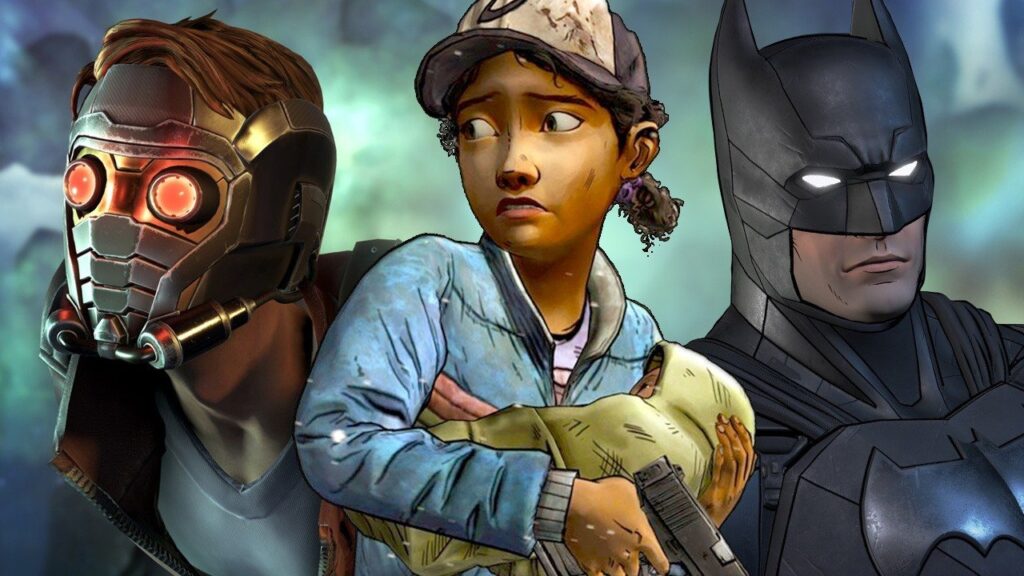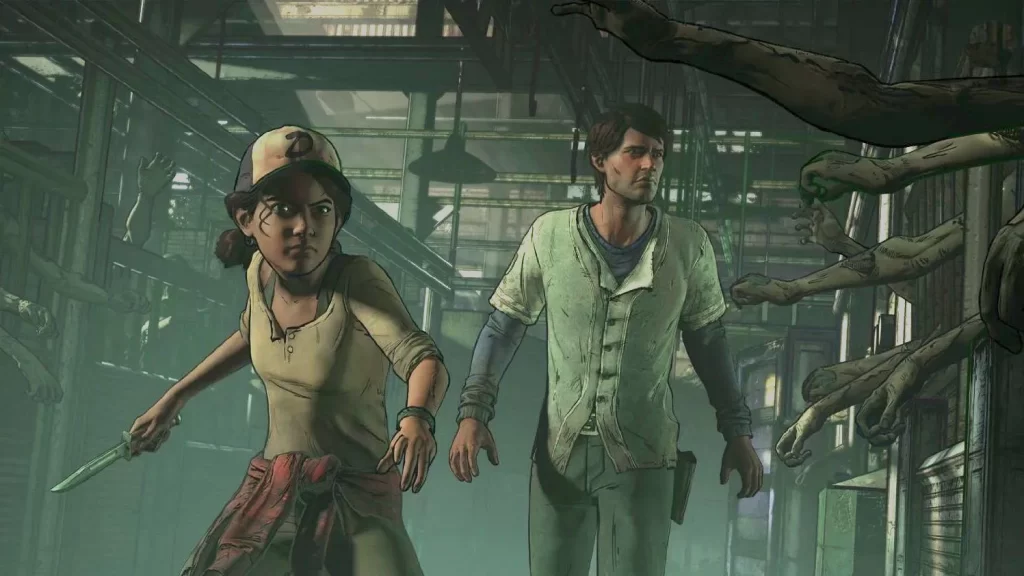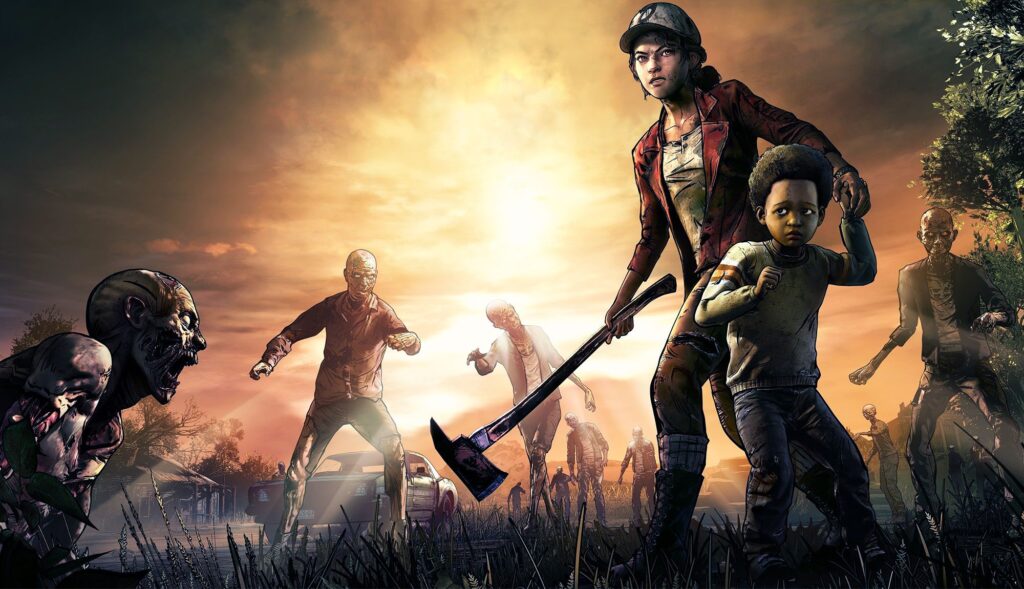Have you ever thought about your favorite video games while you rest your head on the pillow at night and… “wait, did Telltale Games go out of business?“
Unfortunately, yes – Telltale games went out of business a few years ago by now, to the distaste of many fans. Once a name synonymous with top-quality episodic storytelling in the video game industry, Telltale has a storied history that reflects both the brilliance of its innovation and the challenges that come with rapid expansion. Founded in 2004, the company became an industry leader by delivering compelling, narrative-driven games that connected with audiences on a deep emotional level: titles such as The Walking Dead and The Wolf Among Us, which put Telltale Games on the map and cemented its legacy in video game history.
Yet, despite this success, the company experienced a shocking downfall, closing its doors in 2018 – only to reemerge, phoenix-like, a year later. This article will take a deep dive into the journey of Telltale Games, from its rise to its unexpected closure and subsequent revival, as well as explore the key factors that led to its demise.
Don’t miss: All upcoming Star Wars games – what to expect?
The rise of Telltale Games: pioneers of episodic adventure

Telltale was established in 2004 by former LucasArts developers Kevin Bruner, Dan Connors, and Troy Molander.
LucasArts, a giant in the adventure gaming world, had decided to move away from the genre, leaving many of its developers disillusioned. Recognizing an opportunity, Bruner, Connors, and Molander founded Telltale Games to create interactive, episodic adventures that would appeal to both casual gamers and hardcore fans of narrative-driven experiences.
Unlike traditional game studios, which typically focused on releasing complete games, Telltale Games introduced an innovative episodic model. Games would be released in smaller, more frequent installments, allowing players to experience a story in chapters, much like a TV series. This approach kept fans engaged over extended periods and allowed Telltale to test and iterate on player feedback more frequently than competitors.
Their first significant success came in 2007 with Sam & Max Save the World, which cemented their reputation as adept storytellers. But it was 2012’s The Walking Dead that would forever change the trajectory of the company.
Overexpansion and the road to ruin
As Telltale Games continued to grow, the success of The Walking Dead encouraged the company to expand rapidly.
Flush with cash and a growing reputation, Telltale signed deals with high-profile intellectual properties (IPs) like Game of Thrones, Minecraft, Batman, Guardians of the Galaxy, and Borderlands. These partnerships were designed to capitalize on the popularity of well-known franchises and ensure a steady stream of episodic content for years to come.
However, beneath the surface, cracks were beginning to form. Telltale’s expansion came at a high cost. The studio’s workforce ballooned from a small, tight-knit team to over 300 employees in just a few years, leading to overwork and burnout. Its proprietary game engine, the Telltale Tool, which was designed for smaller-scale projects, struggled to keep up with the demands of modern gaming. As a result, the quality of games suffered, with rushed production schedules and buggy, outdated technology.
The episodic release model, once a strength, became a hindrance as well. Players became frustrated with inconsistent release schedules and long waits between episodes, while the pressure to deliver regular content overwhelmed Telltale’s developers. Coupled with a toxic workplace culture marked by crunch time (extended periods of overtime) and mismanagement, the company was stretched thin. Creative differences also began to surface, as many of the original developers who had been instrumental in Telltale’s success left the company.
How did Telltale Games go out of business?
By 2018, Telltale Games was in dire straits. The company had bet heavily on multiple projects and licensing deals, but the results were mixed. Some titles, like The Wolf Among Us and Tales from the Borderlands, were well-received by fans, but others, such as Game of Thrones and Guardians of the Galaxy, failed to capture the same level of critical or commercial success.
The financial pressure was immense. Telltale Games was operating on thin margins, relying heavily on external funding to keep the company afloat. In September 2018, the studio’s financial woes came to a head. Unable to secure additional funding, Telltale Games announced a “majority studio closure,” laying off most of its staff and effectively ceasing operations. Only a small skeleton crew remained to wrap up unfinished projects, but even they were let go shortly afterward.
The closure shocked both fans and employees, who had little warning that the company was in such dire straits. The suddenness of the shutdown left many workers without severance pay, health benefits, or time to prepare for unemployment. Fans were devastated, as several anticipated projects, including The Wolf Among Us 2 and Stranger Things, were abruptly canceled.

The revival: a new dawn for Telltale Games?
So, in the end, Telltale Games went out of business – and appeared to be over – another example of a once-great company brought down by its own ambition. However, in a surprising turn of events, Telltale was resurrected in 2019 when the company’s assets were acquired by LCG Entertainment. This new entity, which retained the Telltale Games name, set out to rebuild the studio and restore its legacy.
The revival of Telltale Games was met with cautious optimism. On the one hand, fans were excited at the prospect of unfinished stories being completed. The Wolf Among Us 2, in particular, was a title many players were eager to see return. On the other hand, there were concerns about whether the new Telltale could avoid the pitfalls that had led to the original studio’s downfall.
LCG Entertainment’s approach was different from Telltale’s previous management. The new owners made a concerted effort to scale the company more sustainably, avoiding the overexpansion and excessive workloads that had plagued the original studio. They also retired the Telltale Tool engine, opting instead to use the more modern Unreal Engine for future projects.
The challenges of rebuilding a legacy
Rebuilding Telltale Games was no easy task. The company had to navigate a competitive landscape filled with other developers producing high-quality, narrative-driven games. Moreover, Telltale had lost many of its key staff members, including the creative talents that had been instrumental in the studio’s earlier successes.
Another challenge was the loss of certain intellectual property rights. Some of Telltale’s most popular franchises, such as The Walking Dead, had moved on to other developers, leaving the revived studio without some of its marquee titles. However, Telltale still retained the rights to develop games based on The Wolf Among Us and Batman, which allowed them to begin rebuilding their portfolio.
Despite these challenges, Telltale Games remained committed to its core mission: storytelling. The studio continued to develop episodic, narrative-driven adventures, with The Wolf Among Us 2 being one of the most highly anticipated releases. Early previews and updates have indicated that the game is staying true to its roots while benefiting from modern technology and lessons learned from the past.

So, yes – Telltale Games went out of business
Telltale Games went out of business in 2018, but the story didn’t end there. Thanks to LCG Entertainment’s acquisition of the company’s assets in 2019, Telltale Games – at least its IPs and overall essence – was revived and continues to develop games today. The studio has a long road ahead, but it is once again trying to deliver the narrative-driven experiences that fans have come to love.
If you’re passionate about staying informed on the latest trends, game releases, and in-depth stories like this, be sure to follow Main Leaf. Our blog is dedicated to bringing you fresh updates and expert insights into the video game world. Stay connected with us to keep your finger on the pulse of the gaming industry and never miss out on what’s coming next!

